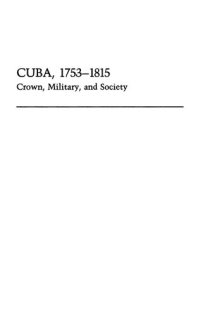
Ebook: Cuba, 1753-1815: Crown, Military, and Society
Author: Allan J. Kuethe, Allan J. Kueth
- Year: 1986
- Publisher: University of Tennessee Press
- Language: English
- pdf
In this pioneering study of eighteenth-century Cuba, Allan J. Kuethe analyzes the reform of the Cuban army following its humiliation at the hands of the British in 1762. Particularly instructive is the author’s account of the interaction between military priorities, the emerging colonial social structure, and the broader reform program of the Bourbon monarchy.
The crown hesitated to arm native-born subjects to defend the island, but Spanish regulars were expensive and often could not withstand the tropical climate. Skillful, reform-minded officials thus worked to create a well-armed and well-trained creole militia supplemented by black volunteers.
Commissions and legal incentives tied the colonial elites to the military reform, helping secure their acquiescence to higher levels of taxation. The elites in turn demanded and received lucrative commercial concessions, which worked to underpin the great sugar boom of the late century. The crown’s masterful strategy gave Cuba a militia that could be trusted to defend the home front during the wars of the American and French Revolutions, freeing regulars to fight elsewhere, and that would remain loyal during the crisis following the French seizure of the Spanish throne in 1808.
—from the flaps of the dust jacket.
Includes a Bibliography and an Index
The crown hesitated to arm native-born subjects to defend the island, but Spanish regulars were expensive and often could not withstand the tropical climate. Skillful, reform-minded officials thus worked to create a well-armed and well-trained creole militia supplemented by black volunteers.
Commissions and legal incentives tied the colonial elites to the military reform, helping secure their acquiescence to higher levels of taxation. The elites in turn demanded and received lucrative commercial concessions, which worked to underpin the great sugar boom of the late century. The crown’s masterful strategy gave Cuba a militia that could be trusted to defend the home front during the wars of the American and French Revolutions, freeing regulars to fight elsewhere, and that would remain loyal during the crisis following the French seizure of the Spanish throne in 1808.
—from the flaps of the dust jacket.
Includes a Bibliography and an Index
Download the book Cuba, 1753-1815: Crown, Military, and Society for free or read online
Continue reading on any device:

Last viewed books
Related books
{related-news}
Comments (0)